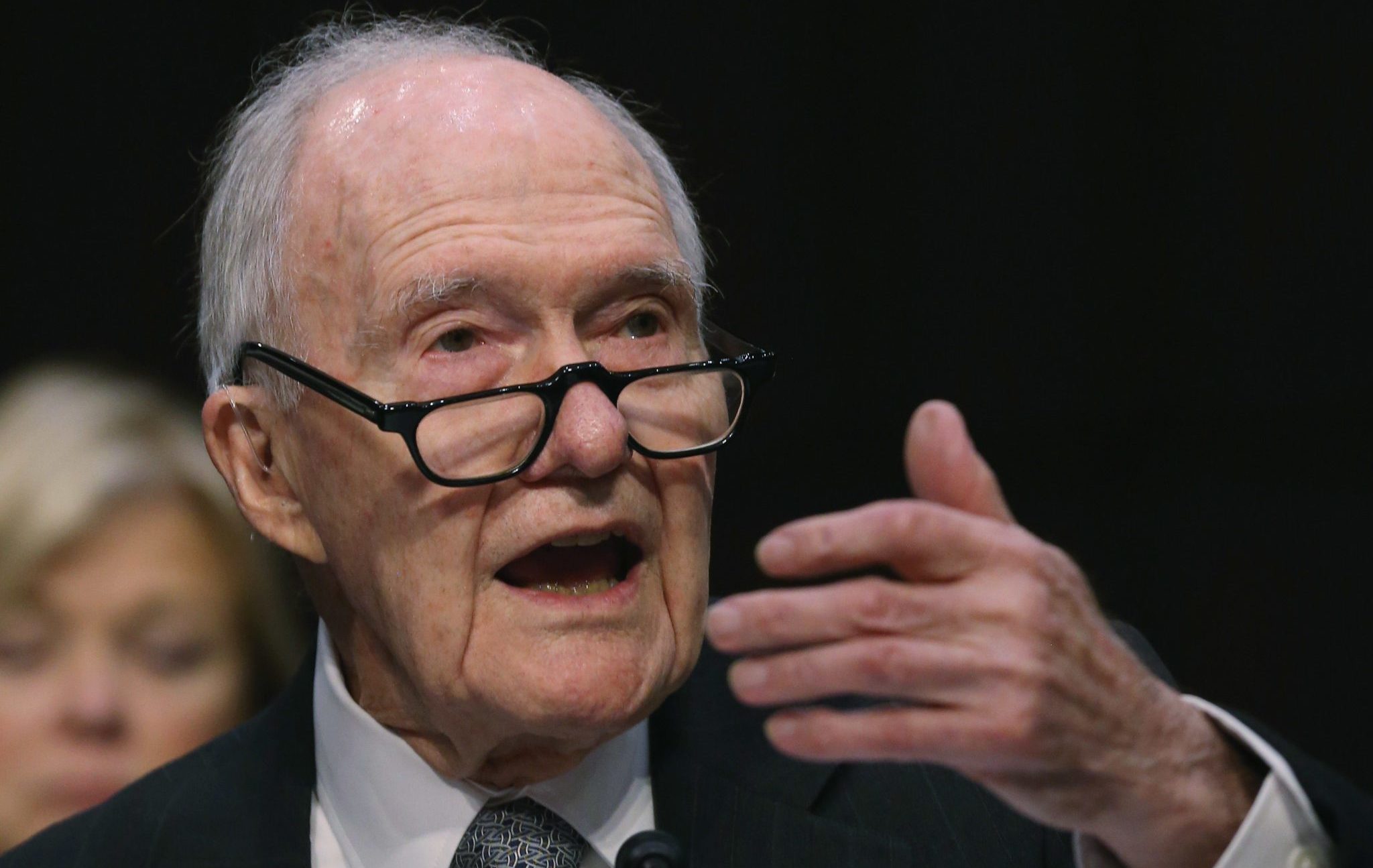Putin Needed a Scowcroft

Former President George W. Bush famously spoke as if English were his second language. It proved so again last Wednesday. In a darkly ironic slip, Bush denounced the invasion of Iraq as “unjustified,” before clarifying that he meant Ukraine.
Bush blamed old age for the gaffe, but the error only highlighted the similarity between the two ill-fated invasions. Just as America wrongly expected a “cakewalk” in Iraq, Russia has found itself in an unexpectedly long slog in Ukraine.
Bush meant to contrast the American political system, which permits debate before undertaking military action, with President Vladimir Putin’s dictatorship, which precludes it. Bush is correct as far as that goes. But the slip suggests we revisit former National Security Advisor Brent Scowcroft’s objections in the months leading up to the Iraq War.
In his career, Scowcroft had ascended to the rank of lieutenant general in the Air Force, acted as assistant to Henry Kissinger during the Nixon Administration, and served as National Security Advisor to Presidents Gerald Force and George H.W. Bush, the only individual to ever serve in the position twice. He concluded his career under Bush 43 as Chair of the President’s Intelligence Advisory Board. This made his dissent exceptional, especially given that Bush 43’s director of Central Intelligence, George Tenet, was foremost in asserting the conclusion that Iraq possessed nuclear weapons.
Scowcroft did not protest Tenet’s verdict, but came to a different conclusion with the same intelligence, namely, to strengthen the inspection regime. Accordingly, General Scowcroft gave direct advice: “Don’t Attack Saddam.”
The general readily acknowledged that the world would be better with Saddam gone, but cautioned that a military invasion would detract from what was then America’s principal national-security goal: winning the war on terrorism. Further, Sowcroft feared an invasion would destabilize other Arab regimes and risk regional security.
Scowcroft’s numerous warnings were ultimately borne out: The triumphant three-week invasion did deteriorate into a multi-year occupation. The war was enormously expensive. Long-standing allies did refuse to join the coalition. Occupying Iraq did hamper global counterterrorism efforts. Proceeding unilaterally did isolate the United States on the international stage.
With Russia’s invasion of Ukraine approaching the 100-day mark, Scowcroft’s insights provide principles to which all advocates of force should adhere.
The brief history of Russia’s special military operation echoes America’s Operation Iraqi Freedom in multiple ways. Successful conquest of the Donbas will be followed by bloody resistance. Sanctions will cripple an already dysfunctional economy. Surprisingly tough Ukrainian defenses will not only deplete Russia’s unexpectedly weak military arsenal but, worse, damage an only recently restored reputation as “great-power competitor.” Russia will be spared isolation by virtue of its alliance with China, but a debilitated military and economy (as well as demographic stagnation) will consign a once-proud superpower to the role of junior partner.
If Putin had a Scowcroft at his side in early February 2022, he might have avoided this disaster.
Unfortunately for the United States and Iraq, Bush 43 did have a Scowcroft, but he ignored him. While Scowcroft was not fired by Bush, taking his objections public did foreclose his access to the White House.
Scowcroft’s fate illustrates a distinguishing factor between America’s policy debates and Russia’s. Putin publicly convened his security council before the war, ostensibly to solicit their honest input, but instead humiliated his chief spy, Sergei Naryshkin. Putin’s “advisors” were apparently everything but, and the Russian military’s poor performance seems to confirm that Putin’s team is nothing more than the typical cadre of sycophants that surrounds a dictator.
But perhaps the Scowcroft episode underscores the similarity between the two misguided military undertakings. Putin may be openly unencumbered as the dictator of Russia, but the checks and balances embedded in the U.S. Constitution barely hindered President Bush’s march to war in 2002. Bush originally claimed the 2001 authorization to use military force against Al Qaeda granted him the power to launch military operations against Hussein, but he eventually yielded to demands he request approval from Congress.
The outcome was hardly in doubt, though, as the legislative branch had more experience ceding its war-making powers to the executive branch than in wielding those powers. Two months after Scowcroft’s warning, the Senate approved the Iraq War resolution by a vote of 77 to 23. Several Senators eventually renounced their yes votes but, after twenty years in and the calamitous withdrawal from Afghanistan, the 2002 authorization is still in effect.
During the current Ukraine crisis, elected representatives have tried to outdo each other in denouncing Putin and pledging even more support for Ukraine. Congressional hawks succeeded in increasing the latest presidential request for military assistance from $33 billion to $40 billion; the Senate just approved the amount by a lopsided vote of 86 to 11.
President Biden may have pledged not to commit American forces to Ukraine, but the sheer scope of Congress’s monetary assistance is inherently escalatory. The size of the second military-assistance package alone is almost seven times larger than Ukraine’s defense expenditures and approximately two-thirds the size of Russia’s 2021 military budget. As media reports emerge of American intelligence assisting Ukrainian forces, Putin may not see much difference between dollars and deployments.
Neither America’s past nor Russia’s future had to be marked by such needless fiasco. But Scowcroft, once emblematic of the realism and caution integral to sound national-security decision-making, has unfortunately proved the last of his kind.
R. Jordan Prescott is a private contractor working in defense and national security since 2002.
Comments